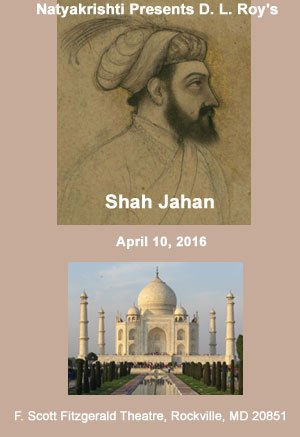Shah Jahan
F. Scott Fitzgerald Theatre
603 Edmonston
Drive
Rockville, MD 20851
April 10, 2016
For one page flyer,
click
here
For a gallery of
pictures, click
here
For the
full video, click
here
Shah Jahan, is a
dramatization of the story of the world's
greatest love and worst treachery - the story of
Mughal Emperor Shah Jahan, his beloved wife
Mumtaz Mahal, and his estranged son Aurangzeb -
with embedded songs and dance. The original play
by D.L. Roy

D. L. Roy’s Shah Jahan
Jogabrata Majumdar
Inheritance of power
and wealth in the Mughal Empire was not
determined by virtue of the authority bestowed
upon the first born child, but by the
competition among the princes in achieving
military successes and consolidating their power
to capture the throne. This often led to
rebellions and wars of succession at the cost of
human dignity and lives. As a result, throughout
many centuries, a complex and ruthless political
climate surrounded the Mughal dynasty and their
courts. History preaches that autocratic
tyranny, no matter how powerful, inevitably gets
sucked into dark hole of history and fades into
oblivion. In fact, the civilized world has its
own constitution based on human dignity and
love; and those who conform to this
constitution, always survive.
D.L. Roy’s
classic drama “Shah Jahan” provides ample
testimony to prove that power and wealth should
not be the principal criteria for an empire to
survive. The certainty for survival lies in
love, freedom and dignity of human being, which
never prevail in an autocratic system.
To
bring out the light and shade in the portrayals
of the principal characters namely, Shah Jahan,
Jahanara, Aurangzeb, Dara, Nadira, Murad, Suja,
Piyara, Jaswant Singh and other minor
characters, their words and actions establish
protagonists and antagonists. They provide
contrast and severe conflict between two
different beliefs, namely power monger-ism and
the philosophy of eternal truth. In this drama,
we would like to direct audience attention on to
the inevitable termination of an autocratic
system, and what prevails in the end can be
exemplified by Tagore’s famous poem “Ora Kaj
Karey”:
Raj chhatra bhengey parey, rana
danka sabda nahi toley
Jayastambha murha sama
artha tar bholey
Rakta makha astra hatey jata
rakta ankhi
Sishu pathya kahinitey thakey
mukh dhaki
Ora kaj karey deshe deshantarey
Anga banga kalinger samudra nadir ghatey ghatey
**** **** *** ***
Sata sata samrajyer bhagna
sesh parey
Ora kaj korey.
|

